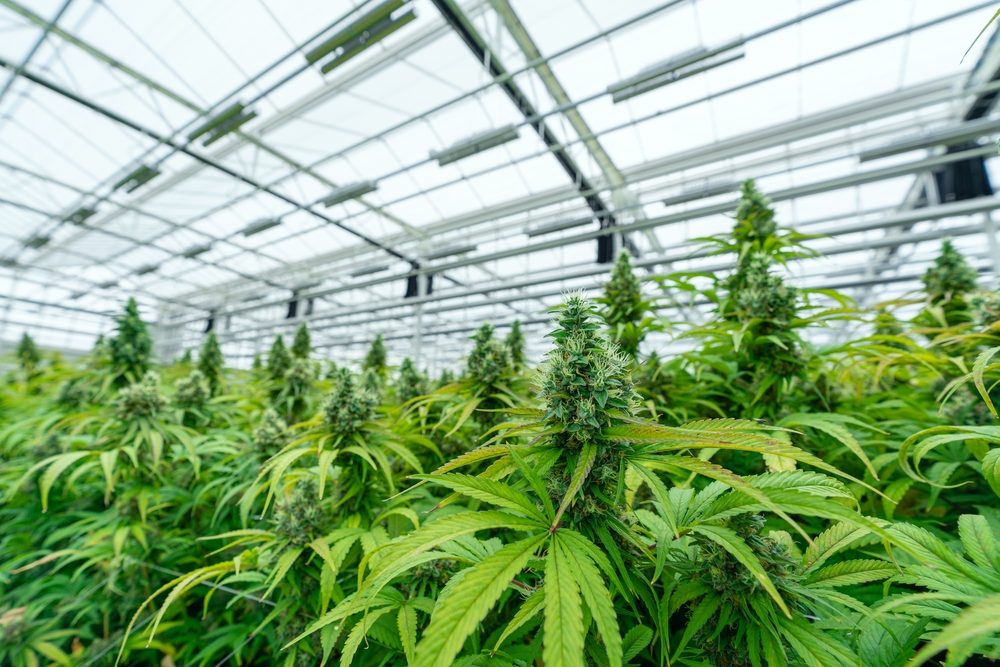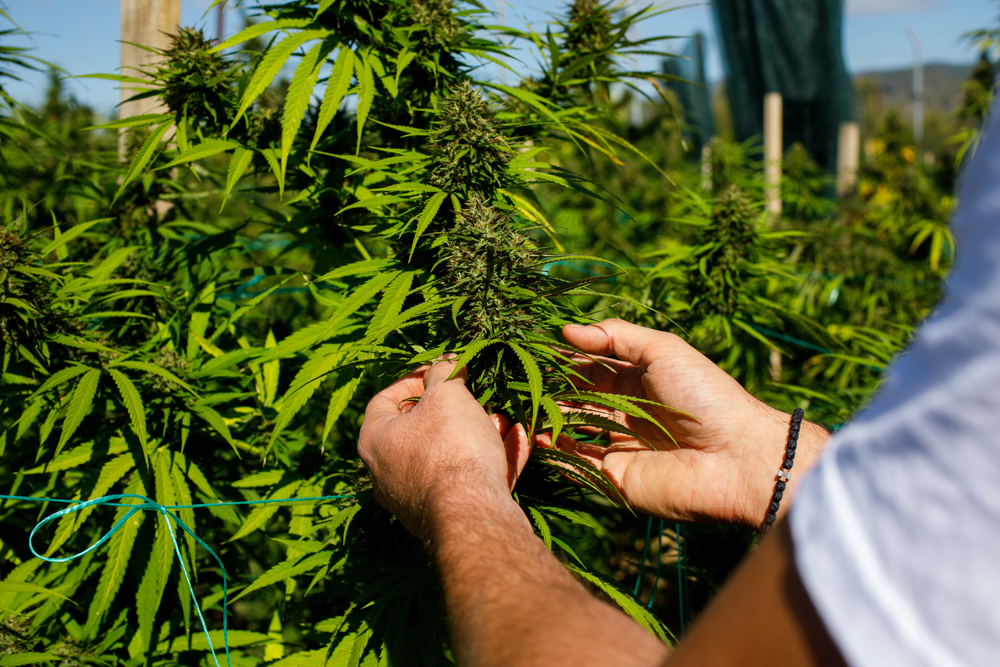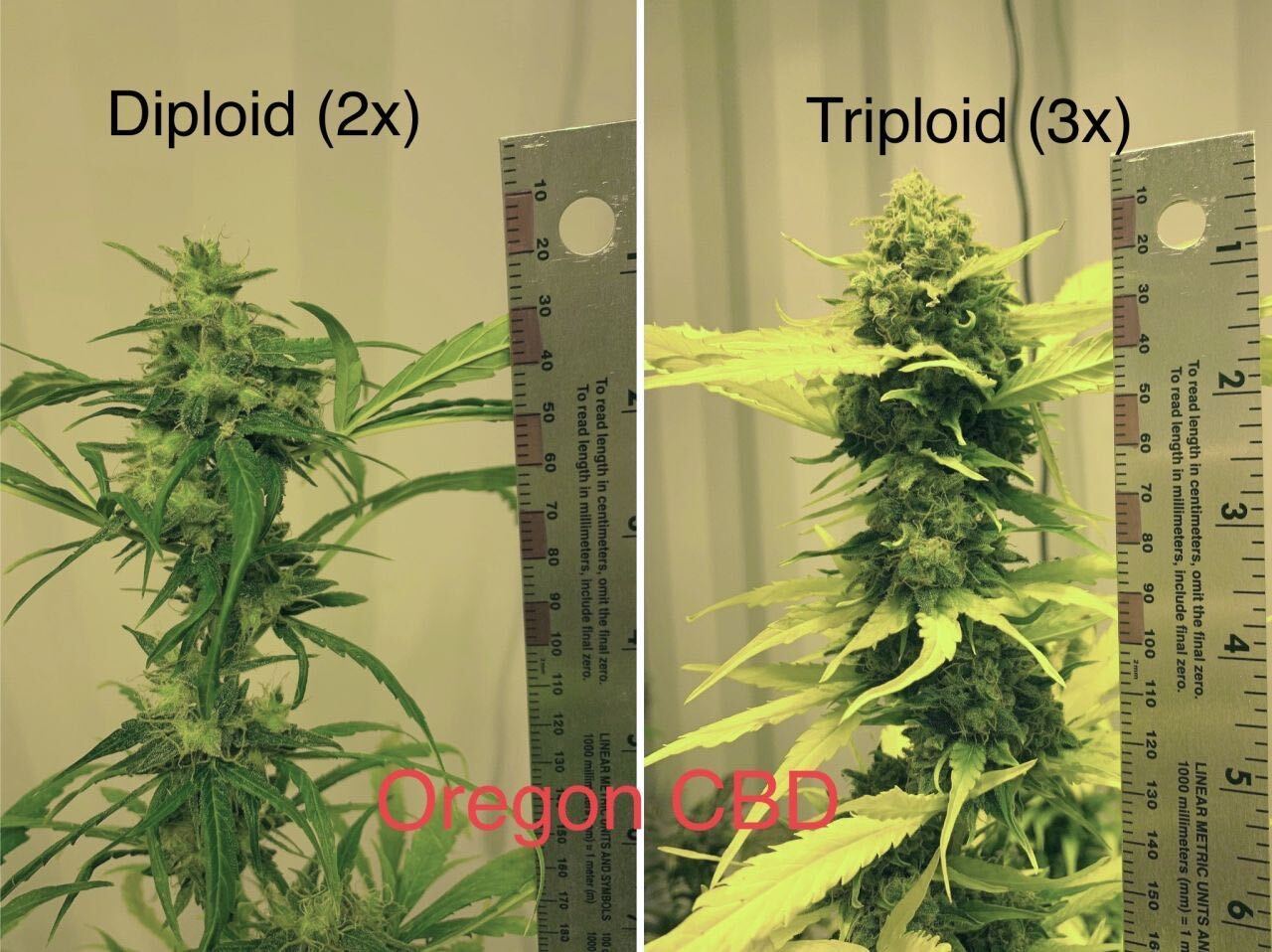In the ever-dynamic landscape of the world of cannabis cultivation, science and technology continue to mark significant milestones. One of the most recent feats, carried out in 2022 by perhaps the most prestigious Californian company in terms of genetics, Dark Heart Industries, is the creation of triploid cannabis, an achievement that could radically transform the cannabis cultivation industry throughout the planet.
In this article, we will explain everything you need to know about triploid cannabis seeds, exploring how this promising innovation could be a game-changer in the cannabis landscape, especially for commercial growers. From its origin and advantages to its impact on the production and quality of cannabis, today we invite you to explore this innovative contribution to the world of marijuana cultivation. Welcome to a journey of discovery in the exciting realm of triploid cannabis!

Diploid cannabis, the natural form of marijuana
Diploid cannabis refers to marijuana plants that possess two complete sets of chromosomes in each cell, which is the normal chromosome configuration for most species in the plant world, including cannabis. Thus, “diploidy” indicates the presence of two sets of homologous chromosomes in each of the plant cells, and is the predominant and natural form of this plant in its wild and cultivated state.
In slightly simpler terms, diploid cannabis cells have one set of chromosomes inherited from the mother plant (pollen recipient) and another set from the male parent or pollen donor plant. At the moment when the male pollen fertilizes the female flower, these sets of chromosomes join together in the future seed, which will give rise to plants with traits coming from both sets. In this way, it can be said that this combination of genetic material from both parents is essential in the sexual reproduction of cannabis since it determines the characteristics and hereditary traits that the offspring will present.
Most cannabis varieties are diploid, and as we know this chromosome configuration is essential for genetic variability and healthy reproduction of the plant. However, the triploid cannabis plants being developed today have three sets of chromosomes instead of two, which gives rise to a series of interesting traits for the grower, especially for the professional who uses a large number of specimens per crop.
Triploid cannabis seeds are one of the most recent innovations in our field and have the potential to become a true revolution, comparable – according to some – to the appearance of feminized seeds more than two decades ago.
“The ability to grow THC-rich cannabis from sterile, triploid seeds and clones that are guaranteed to produce virtually seedless plants is a huge win for the cultivators we support. Pollen-proof cannabis, and the advantages it offers, will help move cannabis production from artisanal cultivation to large-scale agriculture”. Dan Grace, CEO of Dark Heart Industries.

Polyploidy and cannabis
Polyploidy in cannabis refers to the presence of more than two sets of chromosomes in the plant cells. While most cannabis plants are diploid, with two sets of chromosomes (2n), polyploidy implies a higher chromosome number. Triploid cannabis plants, with three sets of chromosomes (3n), are a specific example of polyploidy in this plant, as well as tetraploid (4n).
The creation of polyploid cannabis, like the triploid plants we are dealing with today, generally involves genetic manipulation or specific treatments during reproduction, such as the use of colchicine or oryzalin to obtain tetraploid individuals. As a general rule, exposing a diploid flower to pollen from a tetraploid plant treated with polyploidy-inducing chemicals can result in triploid seeds; The seed produced this way will have 2 copies of chromosomes from the tetraploid parent and 1 set from the diploid parent, 3 copies of chromosomes in total.
Some aspects related to polyploidy in cannabis include:
- Advantages in commercial production: Triploid cannabis plants can have advantages in commercial production, as they are less likely to produce seeds, which improves the quality of the final product and avoids many problems for the grower. They produce more biomass and may have greater tolerance to adverse factors such as pests and diseases or lack of irrigation.
- Genetic stability: Polyploidy may contribute to greater genetic stability in cannabis plants, resulting in more uniform and predictable characteristics in offspring. Again, a more than interesting feature for the professional grower.
- Challenges in fertility: However, polyploid plants, including triploids, often face challenges in producing viable seeds due to problems in meiosis, the process of gamete formation.
- Potential impact on cannabinoid production: It has been speculated that polyploid plants could have an impact on cannabinoid and terpene content, although more research is needed to fully understand these implications. According to early studies, it seems that triploid plants could produce between 30 and 50% more terpenes… truly crazy!
It is essential to highlight that research on polyploid cannabis and its effects is at a relatively early stage, and the topic continues to be explored and studied by the scientific community and the cannabis industry. You will no doubt soon hear about the first commercial strains of triploid cannabis!

What is triploid cannabis?
As we have mentioned, in 2022 the Californian company dedicated to cannabis genetics Dark Heart Industries presented its first triploid varieties developed thanks to its PistilGuard technology, that is, with three sets of chromosomes in its cells. A trait that, far from being insignificant, provides a series of characteristics that make these exemplary plants quite different when it comes to cultivation than traditional genetics, whether we are talking about feminized, auto-flowering, or regular seeds. But…how is a diploid marijuana plant different from a triploid one? We answer you below.
Differences between diploid and triploid cannabis
Chromosome number:
- Diploid: Two sets of chromosomes (2n)
- Triploids: Three sets of chromosomes (3n)
Origin and fertilization:
- Diploid: They result from normal fertilization between a male flower and a female flower
- Triploids: They are created artificially by crossing a diploid plant with another tetraploid plant
Fertility and seeds:
- Diploid: Fertile, produces seeds that can give rise to viable plants
- Triploids: Less fertile, have difficulty producing viable seeds
Seed production capacity:
- Diploid: Can produce seeds naturally under adequate pollination conditions
- Triploids: Difficulty producing viable seeds due to lack of efficient chromosome division in meiosis
Relative sterility:
- Diploid: Less likely to be sterile compared to triploid plants
- Triploids: They tend to be more sterile due to the problems in meiosis and gamete formation already mentioned

Advantages of triploid marijuana production:
- Diploids: Traditionally used in cannabis production
- Triploids: They present advantages in commercial production, such as the reduction of unwanted seeds, greater uniformity between specimens, and an increase in the production of active ingredients and biomass. In contrast, somewhat slower growth is observed in polyploid plants
Performance and quality of triploid plants:
- Diploids: Variable, with a wide range of characteristics and performance
- Triploids: Expected to offer more stable yields and possibly better quality in terms of cannabinoid and terpene content
Genetic stability:
- Diploids: They contribute to the natural genetic variability of cannabis populations
- Triploids: They could be more genetically stable due to their unique chromosome configuration
Importantly, triploid plants, being a more recent innovation, are primarily being explored in the context of commercial cannabis production and could offer certain benefits in terms of yield and quality. With these seeds, risks such as cross-pollination and accidental seed production are avoided, which can cause real headaches for the commercial grower. However, these differences in fertility and seed production must also be considered when evaluating your application, as they prevent the growers from producing their seeds.
The future of cannabis cultivation
The introduction of triploid cannabis seeds represents a significant development with the potential to transform the cannabis cultivation sector in the coming years. These seeds, containing three sets of chromosomes instead of two, offer key benefits to commercial growers, benefits that have already been seen in other types of large-scale crops such as corn or wheat, as well as fruits such as watermelon. , apples or bananas (yes, the seedless watermelons you usually buy are triploid!).
In summary, the introduction of triploid cannabis seeds represents a promising change that could redefine the dynamics of marijuana cultivation in the industry, whether we are talking about THC-rich varieties or CBD varieties. We will be very attentive to these developments to tell you everything and be able to add triploid cannabis seeds to our catalog very soon!
Happy harvest!
Sources consulted:
- Characteristics of the Diploid, Triploid, and Tetraploid Versions of a Cannabigerol-Dominant F1 Hybrid Industrial Hemp Cultivar, Cannabis sativa ‘Stem Cell CBG’, Seth Crawford , Brendan M. Rojas , Eric Crawford , Matthew Otten, Thecla A. Schoenenberger, Andrea R. Garfinkel, Hsuan Chen
- Polyploidization for the Genetic Improvement of Cannabis sativa, Jessica L. Parsons, Sara L. Martin, Tracey James, Gregory Golenia, Ekaterina A. Boudko, Shelley R. Hepworth
The articles published by Alchimiaweb, S.L. are reserved for adult clients only. We would like to remind our customers that cannabis seeds are not listed in the European Community catalogue. They are products intended for genetic conservation and collecting, in no case for cultivation. In some countries it is strictly forbidden to germinate cannabis seeds, other than those authorised by the European Union. We recommend our customers not to infringe the law in any way, we are not responsible for their use.
Source link
#Triploid #cannabis #seeds #Alchimia #Grow #Shop